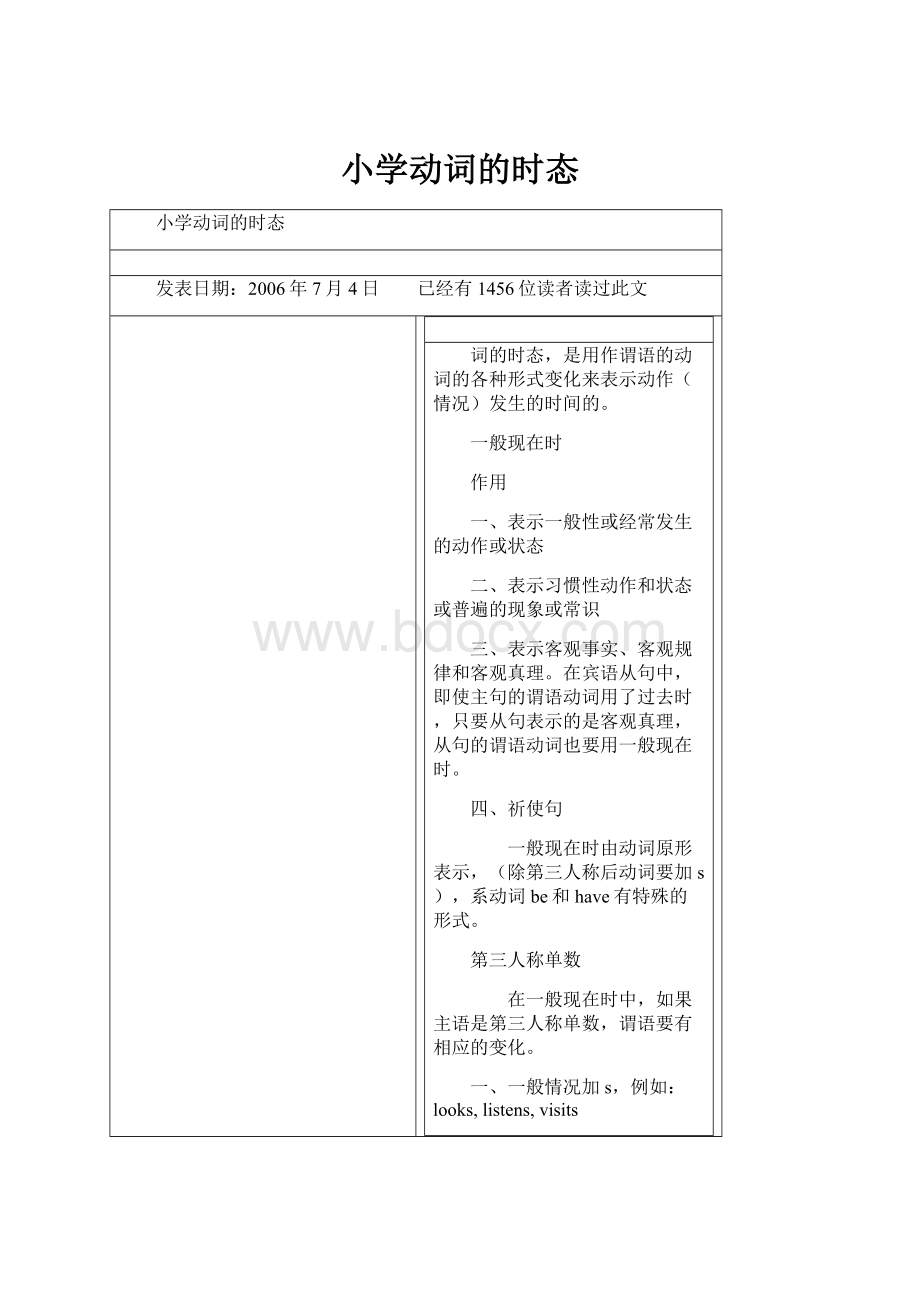小学动词的时态.docx
《小学动词的时态.docx》由会员分享,可在线阅读,更多相关《小学动词的时态.docx(26页珍藏版)》请在冰豆网上搜索。

小学动词的时态
小学动词的时态
发表日期:
2006年7月4日 已经有1456位读者读过此文
词的时态,是用作谓语的动词的各种形式变化来表示动作(情况)发生的时间的。
一般现在时
作用
一、表示一般性或经常发生的动作或状态
二、表示习惯性动作和状态或普遍的现象或常识
三、表示客观事实、客观规律和客观真理。
在宾语从句中,即使主句的谓语动词用了过去时,只要从句表示的是客观真理,从句的谓语动词也要用一般现在时。
四、祈使句
一般现在时由动词原形表示,(除第三人称后动词要加s),系动词be和have有特殊的形式。
第三人称单数
在一般现在时中,如果主语是第三人称单数,谓语要有相应的变化。
一、一般情况加s,例如:
looks,listens,visits
二、以ch,sh,s,x或o结尾的词,加-es,例如:
teaches,washes,guesses,goes,does
三、辅音字母+y结尾,变y为i加-es,例如:
carry-carries,study-studies
读音情况如下:
1、在[p],[t],[k],[f]清辅音后,读[s],例如:
hopes,invites,asks
2、在[z],[s],[?
],[t?
],[d?
]后,读[iz],例如:
teaches,wishes,fixes
3、在浊辅音和元音及其它情况下,读[z],例如:
plans,tries,sends
一般现在时疑问句形式
系动词tobe
动词tohave
实义动词
AmIastudent?
HaveIahand?
DoI(you)work?
Areyouastudent?
Haveyouahand?
Doeshe(she,it)work?
Ishe(she)astudent?
Hashe(she,it)ahand?
Dowe(they,you)work?
Arewe(they)students?
Havewe(they)hands?
一般现在时否定句形式
系动词tobe
动词tohave
实义动词
Iamnotastudent.
Youarenotastudent.
He/sheisnotastudent.
We/They/Youarenotstudents.
Ihaven’tahand.
Youhavenotahand.
He/She/Ithasnotahand.
We/They/Youhaven’thands.
Idon’twork.
He/She/Itdoesn’twork.
We/They/Youdon’twork.
一般现在时态用法
用法
举例
常用时间状语
经常性或习惯性动作
Wegotoschoolat8everyday.
Every
Often
Always
Usually
Sometimes
Nowandthen
Inthemorning
现在的特征或状态
Theboyisalwaysreadytohelpothers.
普遍真理
Theearthgoesroundthesun.
在when,until,before,if等从属连词引导的状语从句里,主句用将来时态,从句用一般现在时
Ishallcometohelpyouifamfreetomorrow.
只用于一般现在时的表示状态和感觉的动词
Be,love,like,want,hope,suppose,need,preferwish,know,find,feel,understand,believe,guess,hear
一般现在时态相对于来说,还是比较简单的。
希望大家课后认真复习。
现在,让我们来练习一下一般现在时态
1.Weoften___________(play)intheplayg 一般现在时态ound.
2.He_________(get)upatsixo’clock.
3.__________you_________(brush)yourteetheverymorning.
4.What(do)heusually(do)afterschool?
5.Danny(study)English,Chinese,Maths,ScienceandArtanschool.
6.Mikesometimes__________(go)totheparkwithhissister.
7.Ateightatnight,she__________(watch)TVwithhisparents.
8.________Mike________(read)Englisheveryday?
9.Howmanylessons_________yourclassmate________(have)onMonday?
10.Whattime_________hismother_________(do)thehousework?
改句子
1.Doyouoftenplayfootballafterschool?
(肯定回答)
2.Ihavemanybooks.(改为否定句)
3.GaoShan’ssisterlikesplayingtabletennis(改为否定句)
4.ShelivesinasmalltownnearNewYork.(改为一般疑问句)
5.IwatchTVeveryday.(改为一般疑问句)
6.Davidhasgotagoal.(改为一般疑问句)
7.Wehavefourlessons.(否定句)
8.Nancydoesn’trunfast(肯定句)
9.Mydogrunsfast.
否定句:
一般疑问句:
10.Mikehastwolettersforhim.
一般疑问句:
否定句:
11.IusuallyplayfootballonFridayafternoon.
否定句:
一般疑问句:
划线提问
12.SuYangusuallywashessomeclothesonSaturday.
否定句:
一般疑问句:
划线提问:
现在进行时
现在进行时:
表示现在正在进行的动作,由“be动词+动词的现在分词”构成。
现在进行时的肯定句
句型
(1)第一人称:
主语+am+现在分词+……
eg.IamwatchingTV.我现在看电视。
(2)第三人称单数:
主语+is+现在分词+……
eg.Sheiswashingthedishes.她正在洗澡。
(3)第二人称及复数人称:
主语+are+现在分词+……
eg.Theyareplayinggames.他们正在做游戏。
现在进行时的否定句
句型主语+相应be动词+not+现在分词+……
eg.Heisn'twatchingTV.他没在看电视。
Iamnotcooking.我没有在做饭。
Wearen'thaveingEnglishcalss.我们没在上英语课。
◆注意◆isnot和arenot可缩写为isn't和aren't。
现在进行时的一般疑问句
句型相应be动词+主语+现在分词+……?
eg.Areyoudancing?
他们正在跳舞吗?
Ishedrawingapicture?
他正在画一张画吗?
Areyoutalkingwithyourfriend?
你正和你的朋友谈话吗?
现在进行一般疑问句的答语
句型
(1)肯定回答:
Yes,主语+相应be动词。
(2)否定回答:
No,主语+相应be动词+not。
eg.Areyoulisteningtothemusic?
Yes,Iam./No,Iamnot.你正在听音乐吗?
是的,我正在听。
/不,我没在听。
IsAuntWangknittingasweater?
No,sheisn't.王阿姨正织毛衣吗?
不,她没有。
现在进行时的特殊疑问句
句型特殊疑问词+相应be动词+主语+现在分词+……?
eg.Whatareyoudoing?
你正在干什么?
Whoissingingasong?
谁在唱歌呢?
Whyaretheycleaningtheirroom?
他们为什么在打扫房间?
现在进行时特殊疑问句的答语
回答特殊疑问时,根据不同的疑问词的情况来决定回答方式。
回答what提问时,答语是现在进行时的肯定形式;回答who提问时,只需说明主语是谁,再加相应的be动词即可。
eg.Whatishedoing?
Heiswritingaletter.他正在干什么?
他正在写信。
Whoisswimminginthelake?
Jimis.谁正在湖里游泳?
吉姆正在游泳。
现在进行时的用法
表示阶段或现在正在发生的动作。
eg.Look!
Heisflyingakite.看,他正在放风筝。
Itisrainingnow.天正下着雨。
Don'tmakeanynoise.Thebabyissleeping.不要吵,孩子正在睡觉。
表示一个最近按计划或安排要进行的动作,可代替将来时,此时一定要与表示将来的时间状语连用;这样应用的主要动词有:
go,come,leave,start,arrive,return等。
eg.AreyougoingtoTianjintomorrow?
你明天去天津吗?
HeisleavingforBeijingateighttomorrow.明天八点他要去北京。
动词现在进行时常与always搭配使用,表示反复出现或习惯性的动作,隐含说话人的赞扬、喜好或厌恶的情绪。
eg.Heisalwaystalking.你老是说个没完没了。
Sheisalwayshelpingpeople.她总乐于助人。
时间状语:
now,thesedays,recently等。
如果句子中出现提示语,如look,listen等也经常用现在进行时。
要特别注意有些动词没有进行时态
1、表示状态、思想、感情和感觉的动词,如:
see,hear,love,know,want,hope,think等,没有进行时态。
2、当have/has作为“拥有”时,没有进行时态,但表示“开会,吃饭,玩得高兴”等意思时,可以用进行时表达。
eg.Iamhavingmanybooks.(这是错误的句子)
Iamhavingagoodtime.(这才是正确的句子)
动词的现在分词形式构成方法
情况
构成
动词原形
现在分词形式
一般动词原形结尾
加-ing
go
ask
Going
asking
以不发音的字母e结尾
去e加-ing
Write
close
Writing
closing
以重读闭音节结尾,如末尾只有一个辅音字母
双写末尾字母加-ing
Dig
Put
begin
Digging
Putting
beginning
一.按要求改写句子
1.Theboyisplayingbasketball.
否定句:
____________________________
一般疑问句:
_________________________
肯定回答:
__________________________
否定回答:
__________________________
对“isplayingbasketball”提问:
__________________________
对“Theboy”提问:
__________________________
2.Theyaresingingintheclassroom.
否定句:
____________________________
一般疑问句:
_________________________
肯定回答:
__________________________
否定回答:
__________________________
对“aresinging”提问:
__________________________
对“intheclassroom”提问:
__________________________
3.仿照例句造句:
Model:
readabook
--Whatareyoudoing?
--I'mreadingabook.
1).readanewbook
________________
2).cleantheblackboard
________________
4.she,thewindow,open,now.(用现在进行时连词成句.)
_____________________
5.Thebirdsaresinginginthetree.(就划线部分提问)
________________________
6.is,who,thewindow,cleaning?
(连词成句)
______________________
7.Thechildrenareplayinggamesnearthehouse.(就划线部分提问)
________________________
8.Sheisclosingthedoornow.(改成否定句)
______________________
9.Youaredoingyourhomework.(用"I"作主语改写句子)
______________________
10.they,thetree,sing,now,under.(用现在进行时连词成句.)
_____________________
11.TheYoungPioneersarehelpingtheoldwoman.(改成一般疑问句)
______________________
II.单项选择
()1.我在照看孩子.
(A)Iamlookingafterthebaby.
(B)I'mlookafteringthebaby.
(C)Ilookamafteringthebaby.
(D)Ilookingafterthebaby.
()2._____friend'smaking______akite.
(A)I,me(B)My,my
(C)My,me(D)His,his
()3.Isthewoman______yellowyourteacher?
(A)in(B)puttingon
(C)wearing(D)having
()4.Look!
Thetwins_____theirmotherdothehousework.
(A)arewanting(B)help
(C)arehelping(D)arelooking
()5._____arethebirdsdoing?
Theyaresinginginatree.
(A)Who(B)What
(C)How(D)Where
()6.Isshe____something?
(A)eat(B)eating
(C)eatting(D)eats
()7.你在干什么?
(A)Whatisyoudoing?
(B)Whatareyoudo?
(C)Whatareyoudoing?
(D)Whatdoyoudo?
()8.Whatareyoulistening_____?
(A)/(B)for
(C)at(D)to
()9.我正在听他说话.
(A)Ilisteningtohim.
(B)I'mlisteningtohim.
(C)I'mlistentohim.
(D)I'mlisteninghim.
()10.Theyare_____theirclothes.
(A)makeing(B)putting
(C)putaway(D)puttingon
()11.Listen!
She____intheclassroom.
(A)issinging(B)sing
(C)tosing(D)issing
()12.TodayJim______hiswhiteshirtandbrowntrousers.
(A)isputtingon(B)wear
(C)puton(D)iswearing
()13.______areyoueating?
I'meating______meat.
(A)What,some(B)Which,any
(C)Where,not(D)What,a
()14.They______TVintheevening.Theydotheirhomework.
(A)arewatching(B)can'twatching
(C)don'twatch(D)don'twatching
()15.Thechildren_____football.
(A)isplaying(B)areplaying
(C)playthe(D)playa
()16.Theyareflyingkites.
(A)他们喜欢放风筝.(B)他们在放风筝吗?
(C)他们在放风筝.(D)他们常放风筝.
()17.Herearemanybooks.Please_____them.
(A)look(B)write
(C)count(D)taking
()18.Look,Theyareswimmingintheriver.
Iwant_____you.
(A)togowith(B)gowith
(C)helping(D)help
()19.Theman_____(work)mearthehousenow.
()20.Look.Lucyis_____anewbiketoday.
(A)jumping(B)running
(C)riding(D)takeing
III.用现在进行时完成下列句子:
1.What_________you__________(do)?
2.I_____________(sing)anEnglishsong.
3.What________he____________(mend)?
4.He______________(mend)acar.
5.______you__________(fly)akite?
Yes,_______.
6.______she___________(sit)intheboat?
7.______you_____________(ask)questions?
8.We_______________(play)gamesnow.
一般将来时
一般将来时的基本概念
一般将来时表示将来某一时刻的动作或状态,或将来某一段时间内经常的动作或状态。
一般将来时由助动词shall(第一人称),will(第二、三人称)+动词原形构成。
美国英语则不管什么人称,一律用will。
一般将来时的形式
●will常简略为'll,并与主语连写在一起,如:
I'll,he'll,it'll,we'll,you'll,they'll。
●一般疑问句如用willyou…?
其简略答语须是Yes,Iwill或No,Iwillnot;如用Shallyou…?
(较少见)其简略答语须是Yes,Ishall.或No,Ishallnot.。
一般将来时的用法
1)表示将来的动作或状态
一般将来时常与一些表示将来的时间状语连用,如:
tomorrow(明天),nextweek(下周),fromnowon(从现在开始);inthefuture(将来)等。
2)表示将来经常发生的动作。
一般将来时的其他用法
一般将来时表示将来某一时刻的动作或状态,其表达形式除了“shall(第一人称),will(第二、三人称)+动词原形构成”外,还有以下几种形式。
1)“tobegoingto+动词原形”表示即将发生的或最近打算进行的事。
例如:
①Itisgoingtorain.要下雨了。
②Wearegoingtohaveameetingtoday.今天我们开会。
2)go,come,start,move,sail,leave,arrive,stay等可用进行时态表示按计划即将发生的动作,例如:
I'mleavingforBeijing.
我要去北京。
3)“beto+动词原形”表示按计划要发生的事或征求对方意见。
例如:
①Arewetogoonwiththiswork?
我们继续干吗?
②Theboyistogotoschooltomorrow.这个男孩明天要去上学。
4)“beaboutto+动词原形”表示即将发生的动作,意为:
很快,马上。
后面一般不跟时间状语。
例如:
Weareabouttoleave.我们马上就走。
5)某些词,如come,go,leave,arrive,start,get,stay等的一般现在时也可表示将来。
①Themeetingstartsatfiveo'clock.会议五点开始。
②Hegetsoffatthenextstop.他下一站下车
11.4一般将来时
1) shall用于第一人称,常被will所代替。
will在陈述句中用于各人称,在争求意见时常用于第二人称。
WhichparagraphshallIreadfirst.
Willyoubeathomeatseventhisevening?
2) begoingto+不定式,表示将来。
a.主语的意图,即将做某事。
W